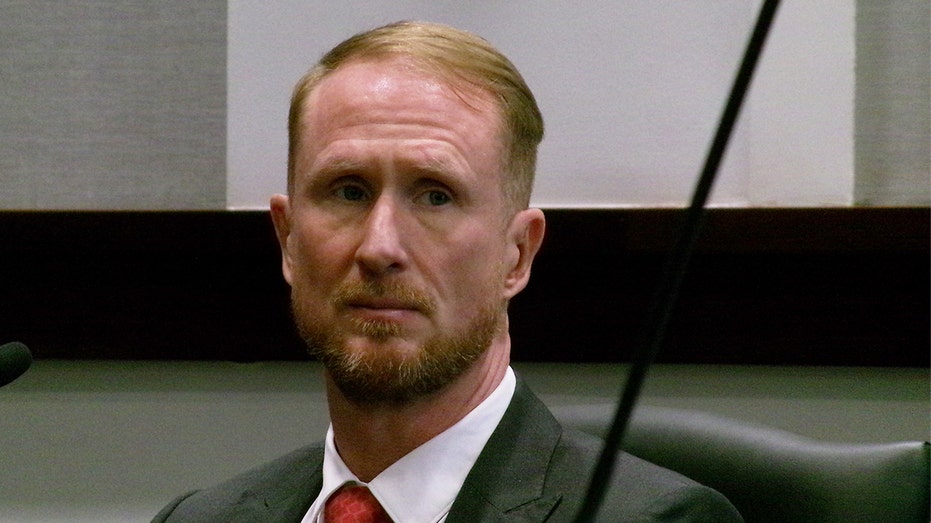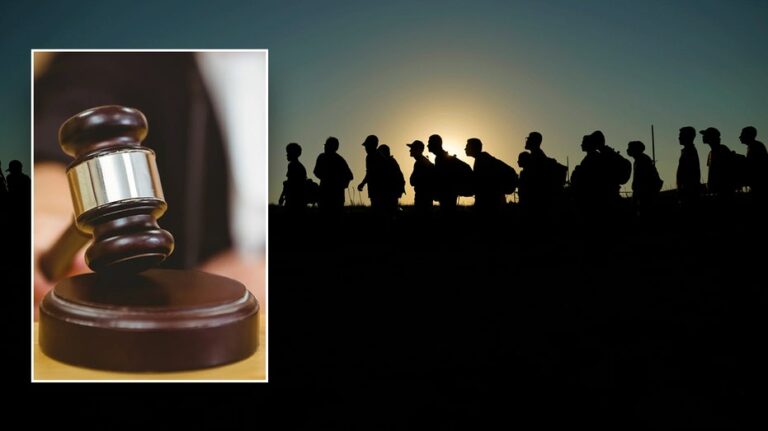
PANAMA CITY, Fla. – U.S. Navy veteran Zachary Young testified on Tuesday that the CNN segment at the heart of his defamation lawsuit against the network had “an immediate and very devastating” impact on his life.
Young alleges that CNN smeared him by implying he illegally profited when helping people flee Afghanistan on the “black market” during the Biden administration’s military withdrawal from the country in 2021. Young believes CNN “destroyed his reputation and business” by branding him an illegal profiteer who exploited “desperate Afghans” during a November 11, 2021, segment that first aired on CNN’s “The Lead with Jake Tapper.”
The high-stakes trial, which started on Monday with jury selection, saw Young called as the first witness on Tuesday after both sides delivered opening statements. Young said “it’s hard to explain to someone outside my world how devastating” it was when “black market” was used to describe where he operates.
“You’re labeled a criminal all over the world,” Young said when questioned by his lead counsel, Vel Freedman.
Young testified he was interested in the national security of the United States and wanted to pursue a career after his time because the world is a “big place,” and the government can’t do everything to keep America safe, so he believes private contractors are vital.
“I’m not a mercenary and I don’t like the term,” Young said when explaining his work for Blackwater and other contractor roles following his service in the Navy.
14th Judicial Circuit Court Judge William S. Henry, who is presiding over the trial in Bay County, Florida, has already ruled that Young “did not act illegally or criminally” despite what the network reported on air. Judge Henry has also declared the court found Young “did not take money from Afghans.”
Tapper first teased the 2021 segment at the center of the suit by warning CNN viewers of “desperate Afghans still trying to escape the country being preyed on by folks demanding that they pay up big time to get out.”
Later in the show, Tapper reminded viewers that the story about “desperate Afghans” being “preyed upon” was up next.
Once the twice-promoted segment began, Tapper said CNN correspondent Alex Marquardt found “Afghans trying to get out of the country face a black market full of promises, demands of exorbitant fees, and no guarantee of safety or success.”
Tapper tossed to Marquardt, who said “desperate Afghans are being exploited” and need to pay “exorbitant, often impossible amounts” to flee the country.
Marquardt then singled out Young, putting a picture of his face on the screen and saying his company was asking for $75,000 to transport a vehicle of passengers to Pakistan or $14,500 per person to end up in the United Arab Emirates.
“Prices well beyond the reach of most Afghans,” Marquardt, who is expected to be called as a witness in the defamation trial, told viewers.
CNN then aired Marquardt allegedly attempting to call Young, who did not answer the phone.
“In a text message, he told CNN that Afghans trying to leave are expected to have sponsors pay for them,” Marquardt said, adding that Young told the network evacuation costs are “highly volatile and based on environmental realities.”
Marquardt then said Young “repeatedly declined to break down the cost or say if he’s making money,” before playing a clip of an anonymous sympathetic man who couldn’t afford to have his family evacuated from Afghanistan.
Marquardt went back to Young, saying he received another text message.
“In another message, that person offering those evacuations, Zachary Young, he wrote, ‘Availability is extremely limited, and demand is high’… he goes on to say, ‘That’s how economics works, unfortunately,’” Marquardt told viewers.
Tapper responded, “Unfortunately, hmm,” before thanking Marquardt for the report.
No other people or companies were named other than Young.
Two different anonymous Afghans were interviewed during the segment. They were concerned about their families stuck in Afghanistan and whether they could afford to evacuate them, but the two people interviewed by CNN had any contact with Young.
Young testified that he never interacted with either man. It’s unclear why their concerns were lumped in with the report on Young.
“It had an immediate and very devastating impact on my life,” Young testified.
CNN TURNS OVER INTERNAL DOCUMENTS AS PART OF HIGH-STAKES DEFAMATION SUIT
CNN issued an on-air apology that Judge Henry has ruled was not particularly adequate. During Tuesday’s trial, Freedman noted that Tapper never apologized to Young. It was CNN’s Pamela Brown substituting for Tapper the day CNN issued its on-air apology, four months after the segment ran.
During testimony, Young detailed his extensive post-Navy work history, including that he constructed the SERE (survival, evasion, resistance and escape) training program for U.S. allies in the United Arab Emirates. He said the program teaches skills needed to get out of dangerous situations, such as in Afghanistan in 2021 after the Biden administration’s botched military withdraw.
He also testified to being eventually hired by DynCorp in 2018 for about $361,000 per year. The jury was shown his contract, which featured a variety of ethical and legal clauses.
Among them, it notes that he could not violate “black market” laws in his host country or else his contract would be terminated without severance. Since the term “black market” was used by CNN in the segment at the center of the case, jurors leaned forward and took notes during this testimony.
Young, who is CIA-trained, outlined his extensive training in things such as “brush passes,” and other sophisticated ways to exchange sensitive information in hostile areas without being detected. It appeared his legal team was making sure the jury was well aware of the particular skills needed to safely vacate someone from a dangerous war zone as Taliban members searched for people attempting to flee.
CNN FACES DEFAMATION SUIT OVER AFGHANISTAN WITHDRAWAL STORY: ‘EVIDENCE OF ACTUAL MALICE’
The testimony then pivoted to Young discussing how difficult it was to evacuate people from Afghanistan especially, comparing it to a frog carefully jumping from lily pad to lily pad until reaching the “very stressful” border.
“It’s a very stressful environment,” he says.
Young, who was paid by both Audible and Bloomberg to evacuate “their people” from Afghanistan, explained that the costs of moving people out of Afghanistan was high and he had to make a profit as a private contractor building a business. He repeatedly said he only wanted to accept money from “sponsors,” which are essentially large corporations like the Amazon-owned Audible and Bloomberg, and didn’t deal with private citizens who would scoff at his prices.
“I am a businessperson, I am also a patriot,” Young said.
He advertised his services on LinkedIn, and said his network is mostly people in the security or military industries and admitted to either ignoring or blocking people he knew that he had no chance of helping.
Late on Tuesday, jurors learned that Young exchanged messages with someone who eventually turned into a CNN source. The woman gave Young a hard time over what he was charging to help people evacuate.
CNN HEADS TO COURT FOR HIGH-STAKES DEFAMATION TRIAL ABOUT AFGHANISTAN SEGMENT
“Sounds more like a retirement plan than a mission of mercy,” the eventual CNN source told Young.
Young started to explain himself and eventually told her to “f–k off.” After she kept messaging him, Young said he didn’t have to defend his prices to some “spiteful b—h on LinkedIn” and blocked her.
The jury didn’t appear exceptionally fazed by Young’s salty language in the messages exchanged with the eventual CNN source, but he expressed regret nonetheless.
“I am a little rough around the edges and I said something I shouldn’t have,” Young testified.
Young’s testimony will continue on Wednesday and will be streamed live on Fox News’ website.
PANAMA CITY, Fla. – U.S. Navy veteran Zachary Young testified on Tuesday that the CNN segment at the heart of his defamation lawsuit against the network had “an immediate and very devastating” impact on his life.
Young alleges that CNN smeared him by implying he illegally profited when helping people flee Afghanistan on the “black market” during the Biden administration’s military withdrawal from the country in 2021. Young believes CNN “destroyed his reputation and business” by branding him an illegal profiteer who exploited “desperate Afghans” during a November 11, 2021, segment that first aired on CNN’s “The Lead with Jake Tapper.”
The high-stakes trial, which started on Monday with jury selection, saw Young called as the first witness on Tuesday after both sides delivered opening statements. Young said “it’s hard to explain to someone outside my world how devastating” it was when “black market” was used to describe where he operates.
“You’re labeled a criminal all over the world,” Young said when questioned by his lead counsel, Vel Freedman.
Young testified he was interested in the national security of the United States and wanted to pursue a career after his time because the world is a “big place,” and the government can’t do everything to keep America safe, so he believes private contractors are vital.
“I’m not a mercenary and I don’t like the term,” Young said when explaining his work for Blackwater and other contractor roles following his service in the Navy.
14th Judicial Circuit Court Judge William S. Henry, who is presiding over the trial in Bay County, Florida, has already ruled that Young “did not act illegally or criminally” despite what the network reported on air. Judge Henry has also declared the court found Young “did not take money from Afghans.”
Tapper first teased the 2021 segment at the center of the suit by warning CNN viewers of “desperate Afghans still trying to escape the country being preyed on by folks demanding that they pay up big time to get out.”
Later in the show, Tapper reminded viewers that the story about “desperate Afghans” being “preyed upon” was up next.
Once the twice-promoted segment began, Tapper said CNN correspondent Alex Marquardt found “Afghans trying to get out of the country face a black market full of promises, demands of exorbitant fees, and no guarantee of safety or success.”
Tapper tossed to Marquardt, who said “desperate Afghans are being exploited” and need to pay “exorbitant, often impossible amounts” to flee the country.
Marquardt then singled out Young, putting a picture of his face on the screen and saying his company was asking for $75,000 to transport a vehicle of passengers to Pakistan or $14,500 per person to end up in the United Arab Emirates.
“Prices well beyond the reach of most Afghans,” Marquardt, who is expected to be called as a witness in the defamation trial, told viewers.
CNN then aired Marquardt allegedly attempting to call Young, who did not answer the phone.
“In a text message, he told CNN that Afghans trying to leave are expected to have sponsors pay for them,” Marquardt said, adding that Young told the network evacuation costs are “highly volatile and based on environmental realities.”
Marquardt then said Young “repeatedly declined to break down the cost or say if he’s making money,” before playing a clip of an anonymous sympathetic man who couldn’t afford to have his family evacuated from Afghanistan.
Marquardt went back to Young, saying he received another text message.
“In another message, that person offering those evacuations, Zachary Young, he wrote, ‘Availability is extremely limited, and demand is high’… he goes on to say, ‘That’s how economics works, unfortunately,’” Marquardt told viewers.
Tapper responded, “Unfortunately, hmm,” before thanking Marquardt for the report.
No other people or companies were named other than Young.
Two different anonymous Afghans were interviewed during the segment. They were concerned about their families stuck in Afghanistan and whether they could afford to evacuate them, but the two people interviewed by CNN had any contact with Young.
Young testified that he never interacted with either man. It’s unclear why their concerns were lumped in with the report on Young.
“It had an immediate and very devastating impact on my life,” Young testified.
CNN TURNS OVER INTERNAL DOCUMENTS AS PART OF HIGH-STAKES DEFAMATION SUIT
CNN issued an on-air apology that Judge Henry has ruled was not particularly adequate. During Tuesday’s trial, Freedman noted that Tapper never apologized to Young. It was CNN’s Pamela Brown substituting for Tapper the day CNN issued its on-air apology, four months after the segment ran.
During testimony, Young detailed his extensive post-Navy work history, including that he constructed the SERE (survival, evasion, resistance and escape) training program for U.S. allies in the United Arab Emirates. He said the program teaches skills needed to get out of dangerous situations, such as in Afghanistan in 2021 after the Biden administration’s botched military withdraw.
He also testified to being eventually hired by DynCorp in 2018 for about $361,000 per year. The jury was shown his contract, which featured a variety of ethical and legal clauses.
Among them, it notes that he could not violate “black market” laws in his host country or else his contract would be terminated without severance. Since the term “black market” was used by CNN in the segment at the center of the case, jurors leaned forward and took notes during this testimony.
Young, who is CIA-trained, outlined his extensive training in things such as “brush passes,” and other sophisticated ways to exchange sensitive information in hostile areas without being detected. It appeared his legal team was making sure the jury was well aware of the particular skills needed to safely vacate someone from a dangerous war zone as Taliban members searched for people attempting to flee.
CNN FACES DEFAMATION SUIT OVER AFGHANISTAN WITHDRAWAL STORY: ‘EVIDENCE OF ACTUAL MALICE’
The testimony then pivoted to Young discussing how difficult it was to evacuate people from Afghanistan especially, comparing it to a frog carefully jumping from lily pad to lily pad until reaching the “very stressful” border.
“It’s a very stressful environment,” he says.
Young, who was paid by both Audible and Bloomberg to evacuate “their people” from Afghanistan, explained that the costs of moving people out of Afghanistan was high and he had to make a profit as a private contractor building a business. He repeatedly said he only wanted to accept money from “sponsors,” which are essentially large corporations like the Amazon-owned Audible and Bloomberg, and didn’t deal with private citizens who would scoff at his prices.
“I am a businessperson, I am also a patriot,” Young said.
He advertised his services on LinkedIn, and said his network is mostly people in the security or military industries and admitted to either ignoring or blocking people he knew that he had no chance of helping.
Late on Tuesday, jurors learned that Young exchanged messages with someone who eventually turned into a CNN source. The woman gave Young a hard time over what he was charging to help people evacuate.
CNN HEADS TO COURT FOR HIGH-STAKES DEFAMATION TRIAL ABOUT AFGHANISTAN SEGMENT
“Sounds more like a retirement plan than a mission of mercy,” the eventual CNN source told Young.
Young started to explain himself and eventually told her to “f–k off.” After she kept messaging him, Young said he didn’t have to defend his prices to some “spiteful b—h on LinkedIn” and blocked her.
The jury didn’t appear exceptionally fazed by Young’s salty language in the messages exchanged with the eventual CNN source, but he expressed regret nonetheless.
“I am a little rough around the edges and I said something I shouldn’t have,” Young testified.
Young’s testimony will continue on Wednesday and will be streamed live on Fox News’ website.






